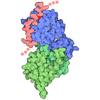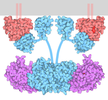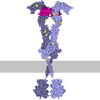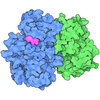+ Open data
Open data
- Basic information
Basic information
| Entry | Database: PDB / ID: 8hgp | ||||||
|---|---|---|---|---|---|---|---|
| Title | The EREG-bound EGFR/HER2 ectodomain complex | ||||||
 Components Components |
| ||||||
 Keywords Keywords | MEMBRANE PROTEIN | ||||||
| Function / homology |  Function and homology information Function and homology informationluteinizing hormone signaling pathway / ovulation / ovarian cumulus expansion / ERBB4-ERBB4 signaling pathway / negative regulation of smooth muscle cell differentiation / negative regulation of immature T cell proliferation in thymus / ERBB3:ERBB2 complex / ERBB2-ERBB4 signaling pathway / primary follicle stage / GRB7 events in ERBB2 signaling ...luteinizing hormone signaling pathway / ovulation / ovarian cumulus expansion / ERBB4-ERBB4 signaling pathway / negative regulation of smooth muscle cell differentiation / negative regulation of immature T cell proliferation in thymus / ERBB3:ERBB2 complex / ERBB2-ERBB4 signaling pathway / primary follicle stage / GRB7 events in ERBB2 signaling / RNA polymerase I core binding / immature T cell proliferation in thymus / female meiotic nuclear division / semaphorin receptor complex / PI3K events in ERBB4 signaling / transmembrane receptor protein tyrosine kinase activator activity / ErbB-3 class receptor binding / motor neuron axon guidance / Sema4D induced cell migration and growth-cone collapse / positive regulation of innate immune response / mRNA transcription / regulation of microtubule-based process / oocyte maturation / epidermal growth factor receptor binding / multivesicular body, internal vesicle lumen / negative regulation of cardiocyte differentiation / Shc-EGFR complex / positive regulation of protein kinase C signaling / Inhibition of Signaling by Overexpressed EGFR / epidermal growth factor receptor activity / EGFR interacts with phospholipase C-gamma / regulation of peptidyl-tyrosine phosphorylation / epidermal growth factor binding / response to UV-A / PLCG1 events in ERBB2 signaling / ERBB2-EGFR signaling pathway / morphogenesis of an epithelial fold / PTK6 promotes HIF1A stabilization / Signaling by EGFR / enzyme-linked receptor protein signaling pathway / ERBB2 Activates PTK6 Signaling / neurotransmitter receptor localization to postsynaptic specialization membrane / digestive tract morphogenesis / ERBB2-ERBB3 signaling pathway / Drug-mediated inhibition of ERBB2 signaling / Resistance of ERBB2 KD mutants to trastuzumab / Resistance of ERBB2 KD mutants to sapitinib / Resistance of ERBB2 KD mutants to tesevatinib / Resistance of ERBB2 KD mutants to neratinib / Resistance of ERBB2 KD mutants to osimertinib / Resistance of ERBB2 KD mutants to afatinib / Resistance of ERBB2 KD mutants to AEE788 / Resistance of ERBB2 KD mutants to lapatinib / Drug resistance in ERBB2 TMD/JMD mutants / neuromuscular junction development / positive regulation of Rho protein signal transduction / intracellular vesicle / eyelid development in camera-type eye / negative regulation of epidermal growth factor receptor signaling pathway / positive regulation of MAP kinase activity / positive regulation of transcription by RNA polymerase I / cerebral cortex cell migration / protein insertion into membrane / ERBB2 Regulates Cell Motility / semaphorin-plexin signaling pathway / positive regulation of protein kinase activity / oligodendrocyte differentiation / protein tyrosine kinase activator activity / positive regulation of cell division / Respiratory syncytial virus (RSV) attachment and entry / Signaling by ERBB4 / PI3K events in ERBB2 signaling / keratinocyte proliferation / positive regulation of phosphorylation / positive regulation of peptidyl-serine phosphorylation / SHC1 events in ERBB4 signaling / positive regulation of protein targeting to membrane / Estrogen-dependent nuclear events downstream of ESR-membrane signaling / anatomical structure morphogenesis / regulation of angiogenesis / hair follicle development / MAP kinase kinase kinase activity / positive regulation of G1/S transition of mitotic cell cycle / GAB1 signalosome / embryonic placenta development / Nuclear signaling by ERBB4 / regulation of ERK1 and ERK2 cascade / Schwann cell development / salivary gland morphogenesis / coreceptor activity / keratinocyte differentiation / Signaling by ERBB2 / myelination / TFAP2 (AP-2) family regulates transcription of growth factors and their receptors / GRB2 events in EGFR signaling / transmembrane receptor protein tyrosine kinase activity / SHC1 events in EGFR signaling / positive regulation of smooth muscle cell proliferation / EGFR Transactivation by Gastrin / positive regulation of mitotic nuclear division Similarity search - Function | ||||||
| Biological species |  Homo sapiens (human) Homo sapiens (human) | ||||||
| Method | ELECTRON MICROSCOPY / single particle reconstruction / cryo EM / Resolution: 4.53 Å | ||||||
 Authors Authors | Zhang, Z. / Bai, X. | ||||||
| Funding support |  China, 1items China, 1items
| ||||||
 Citation Citation |  Journal: Cell Discov / Year: 2023 Journal: Cell Discov / Year: 2023Title: Structure and dynamics of the EGFR/HER2 heterodimer. Authors: Xue Bai / Pengyu Sun / Xinghao Wang / Changkun Long / Shuyun Liao / Song Dang / Shangshang Zhuang / Yongtao Du / Xinyi Zhang / Nan Li / Kangmin He / Zhe Zhang /  Abstract: HER2 belongs to the human epidermal growth factor receptor tyrosine kinase family. Its overexpression or hyperactivation is a leading cause for multiple types of cancers. HER2 functions mainly ...HER2 belongs to the human epidermal growth factor receptor tyrosine kinase family. Its overexpression or hyperactivation is a leading cause for multiple types of cancers. HER2 functions mainly through dimerization with other family members, such as EGFR. However, the molecular details for heterodimer assembly have not been completely understood. Here, we report cryo-EM structures of the EGF- and epiregulin-bound EGFR/HER2 ectodomain complexes at resolutions of 3.3 Å and 4.5 Å, respectively. Together with the functional analyses, we demonstrate that only the dimerization arm of HER2, but not that of EGFR, is essential for their heterodimer formation and signal transduction. Moreover, we analyze the differential membrane dynamics and transient interactions of endogenous EGFR and HER2 molecules in genome-edited cells using single-molecule live-cell imaging. Furthermore, we show that the interaction with HER2 could allow EGFR to resist endocytosis. Together, this work deepens our understanding of the unique structural properties and dynamics of the EGFR/HER2 complex. | ||||||
| History |
|
- Structure visualization
Structure visualization
| Structure viewer | Molecule:  Molmil Molmil Jmol/JSmol Jmol/JSmol |
|---|
- Downloads & links
Downloads & links
- Download
Download
| PDBx/mmCIF format |  8hgp.cif.gz 8hgp.cif.gz | 228.2 KB | Display |  PDBx/mmCIF format PDBx/mmCIF format |
|---|---|---|---|---|
| PDB format |  pdb8hgp.ent.gz pdb8hgp.ent.gz | 175.2 KB | Display |  PDB format PDB format |
| PDBx/mmJSON format |  8hgp.json.gz 8hgp.json.gz | Tree view |  PDBx/mmJSON format PDBx/mmJSON format | |
| Others |  Other downloads Other downloads |
-Validation report
| Arichive directory |  https://data.pdbj.org/pub/pdb/validation_reports/hg/8hgp https://data.pdbj.org/pub/pdb/validation_reports/hg/8hgp ftp://data.pdbj.org/pub/pdb/validation_reports/hg/8hgp ftp://data.pdbj.org/pub/pdb/validation_reports/hg/8hgp | HTTPS FTP |
|---|
-Related structure data
| Related structure data |  34745MC 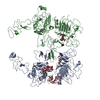 8hgoC 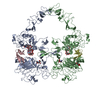 8hgsC M: map data used to model this data C: citing same article ( |
|---|---|
| Similar structure data | Similarity search - Function & homology  F&H Search F&H Search |
- Links
Links
- Assembly
Assembly
| Deposited unit | 
|
|---|---|
| 1 |
|
- Components
Components
-Protein , 2 types, 2 molecules BA
| #1: Protein | Mass: 82149.758 Da / Num. of mol.: 1 Source method: isolated from a genetically manipulated source Source: (gene. exp.)  Homo sapiens (human) / Gene: ERBB2, HER2, MLN19, NEU, NGL / Cell line (production host): HEK293S GnTI- / Production host: Homo sapiens (human) / Gene: ERBB2, HER2, MLN19, NEU, NGL / Cell line (production host): HEK293S GnTI- / Production host:  Homo sapiens (human) Homo sapiens (human)References: UniProt: P04626, receptor protein-tyrosine kinase |
|---|---|
| #2: Protein | Mass: 81075.297 Da / Num. of mol.: 1 Source method: isolated from a genetically manipulated source Source: (gene. exp.)  Homo sapiens (human) / Gene: EGFR, ERBB, ERBB1, HER1 / Cell line (production host): HEK293S GnTI- / Production host: Homo sapiens (human) / Gene: EGFR, ERBB, ERBB1, HER1 / Cell line (production host): HEK293S GnTI- / Production host:  Homo sapiens (human) Homo sapiens (human)References: UniProt: P00533, receptor protein-tyrosine kinase |
-Protein/peptide , 1 types, 1 molecules C
| #3: Protein/peptide | Mass: 5578.410 Da / Num. of mol.: 1 Source method: isolated from a genetically manipulated source Source: (gene. exp.)  Homo sapiens (human) / Gene: EREG / Production host: Homo sapiens (human) / Gene: EREG / Production host:  |
|---|
-Sugars , 3 types, 4 molecules 
| #4: Polysaccharide | alpha-D-mannopyranose-(1-3)-beta-D-mannopyranose-(1-3)-2-acetamido-2-deoxy-beta-D-glucopyranose-(1- ...alpha-D-mannopyranose-(1-3)-beta-D-mannopyranose-(1-3)-2-acetamido-2-deoxy-beta-D-glucopyranose-(1-4)-2-acetamido-2-deoxy-beta-D-glucopyranose Type: oligosaccharide / Mass: 748.682 Da / Num. of mol.: 1 Source method: isolated from a genetically manipulated source |
|---|---|
| #5: Polysaccharide | 2-acetamido-2-deoxy-beta-D-glucopyranose-(1-4)-2-acetamido-2-deoxy-beta-D-glucopyranose Source method: isolated from a genetically manipulated source |
| #6: Sugar |
-Details
| Has ligand of interest | Y |
|---|---|
| Has protein modification | Y |
-Experimental details
-Experiment
| Experiment | Method: ELECTRON MICROSCOPY |
|---|---|
| EM experiment | Aggregation state: PARTICLE / 3D reconstruction method: single particle reconstruction |
- Sample preparation
Sample preparation
| Component | Name: EREG-bound EGFR/HER2 ectodomain complex / Type: COMPLEX / Entity ID: #1-#3 / Source: RECOMBINANT |
|---|---|
| Molecular weight | Value: 0.2 MDa / Experimental value: NO |
| Source (natural) | Organism:  Homo sapiens (human) Homo sapiens (human) |
| Source (recombinant) | Organism:  Homo sapiens (human) / Cell: HEK293S GnTI- Homo sapiens (human) / Cell: HEK293S GnTI- |
| Buffer solution | pH: 7.5 |
| Specimen | Conc.: 4.2 mg/ml / Embedding applied: NO / Shadowing applied: NO / Staining applied: NO / Vitrification applied: YES |
| Vitrification | Cryogen name: ETHANE / Humidity: 100 % / Chamber temperature: 277 K |
- Electron microscopy imaging
Electron microscopy imaging
| Experimental equipment |  Model: Titan Krios / Image courtesy: FEI Company |
|---|---|
| Microscopy | Model: FEI TITAN KRIOS |
| Electron gun | Electron source:  FIELD EMISSION GUN / Accelerating voltage: 300 kV / Illumination mode: FLOOD BEAM FIELD EMISSION GUN / Accelerating voltage: 300 kV / Illumination mode: FLOOD BEAM |
| Electron lens | Mode: BRIGHT FIELD / Nominal defocus max: 1500 nm / Nominal defocus min: 1200 nm |
| Image recording | Electron dose: 60.8 e/Å2 / Film or detector model: GATAN K3 (6k x 4k) |
- Processing
Processing
| EM software |
| ||||||||||||||||||||||||
|---|---|---|---|---|---|---|---|---|---|---|---|---|---|---|---|---|---|---|---|---|---|---|---|---|---|
| CTF correction | Type: NONE | ||||||||||||||||||||||||
| 3D reconstruction | Resolution: 4.53 Å / Resolution method: FSC 0.143 CUT-OFF / Num. of particles: 273388 / Symmetry type: POINT | ||||||||||||||||||||||||
| Atomic model building | Protocol: FLEXIBLE FIT / Space: REAL | ||||||||||||||||||||||||
| Refine LS restraints |
|
 Movie
Movie Controller
Controller





 PDBj
PDBj


